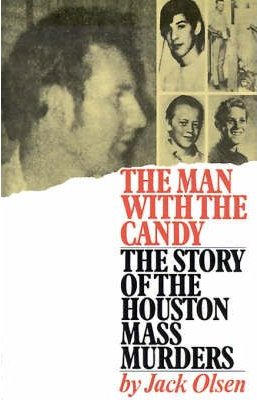
****
Olsen's riveting account of how Dean Corll killed at least 28 boys between the ages of 13 and 19 from 1970-1973, aided and abetted by two teenaged accomplices and the city of Houston, Texas. While it's possible that later works on the case provide more detail (Olsen doesn't appear to have bothered to wait for the trials of Corll's accomplices, one of whom killed Corll before he could dispatch his latest victim), it's unlikely any are informed by the same passion. And it is Olsen's passion, though myopic and arguably elitist, that gives this work its driving force. It's about a hellhole called Houston that is inhabited by worn out, uneducated hicks and policed by overworked cops who have coined their own category of homicide, "misdemeanor murder," so as to be able to focus on the really important crimes -- or to take the weekend off. One gets the sense that Olsen wouldn't have minded much if Houston itself were wiped off the map, instead of just a relatively few children. Not that he doesn't appreciate the children; more that he cannot abide the idea that Houstonians themselves seem to care so little about them. The whole thing would be offensive if it weren't in some respects quite true. The case itself is fascinating in its scope and diabolical incestousness (so many of the victims were located, along with the killers, in the same small area of Houston, and interacted with each other), and even Olsen's recounting of Corll's history late in the book makes for interesting reading (which is not often the case). Unbiased? No. But forcefully written.
Olsen's riveting account of how Dean Corll killed at least 28 boys between the ages of 13 and 19 from 1970-1973, aided and abetted by two teenaged accomplices and the city of Houston, Texas. While it's possible that later works on the case provide more detail (Olsen doesn't appear to have bothered to wait for the trials of Corll's accomplices, one of whom killed Corll before he could dispatch his latest victim), it's unlikely any are informed by the same passion. And it is Olsen's passion, though myopic and arguably elitist, that gives this work its driving force. It's about a hellhole called Houston that is inhabited by worn out, uneducated hicks and policed by overworked cops who have coined their own category of homicide, "misdemeanor murder," so as to be able to focus on the really important crimes -- or to take the weekend off. One gets the sense that Olsen wouldn't have minded much if Houston itself were wiped off the map, instead of just a relatively few children. Not that he doesn't appreciate the children; more that he cannot abide the idea that Houstonians themselves seem to care so little about them. The whole thing would be offensive if it weren't in some respects quite true. The case itself is fascinating in its scope and diabolical incestousness (so many of the victims were located, along with the killers, in the same small area of Houston, and interacted with each other), and even Olsen's recounting of Corll's history late in the book makes for interesting reading (which is not often the case). Unbiased? No. But forcefully written.
 RSS Feed
RSS Feed
